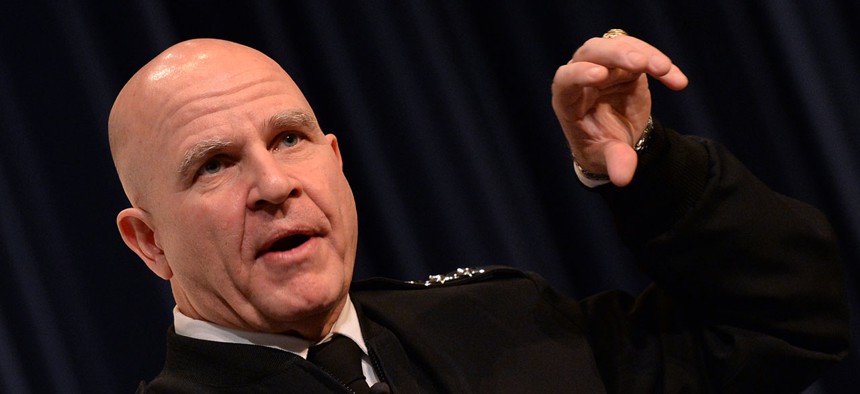
Chief Mass Communication Specialist James E. Foehl/Navy
McMaster Is Out, an Even Bigger North Korea Hawk Is In
Trump is replacing his national-security adviser with John Bolton, a persistent advocate of military intervention.
On Thursday, Donald Trump replaced a man who built the case for war with North Korea as a last resort with a man who just made the case for war with North Korea as more of a first resort. Trump announced that National-Security Adviser H.R. McMaster will be succeeded by John Bolton, the George W. Bush-era United Nations ambassador who has advocated for U.S. military action to prevent Saddam Hussein, Ayatollah Khamenei, and most recently Kim Jong Un from amassing weapons of mass destruction.
North Korea is an “imminent threat” to America because it is only months away from achieving the capacity to deliver nuclear warheads to the U.S. mainland, Bolton wrote in late February in The Wall Street Journal. Therefore “it is perfectly legitimate” for the U.S. to defend itself “by striking [North Korea] first.”
Until today, it was McMaster who was considered Trump’s most militant adviser on North Korea. A three-star general and earnest intellectual, McMaster clashed with Trump personally and on matters of policy; he recommended—over the president’s objections—sticking with the Iran nuclear deal, the war in Afghanistan, and America’s commitments to NATO allies and pushback against Russian aggression. McMaster, like Rex Tillerson, notably used his final days in office to condemn Russian malfeasance in ways his boss never has.
But in fleshing out the administration’s national-security policies, McMaster sought to fuse Trump’s America First nationalism with his own brand of “principled realism.” “I would not put H.R. in the Hobbes camp where life is nasty, brutish, and short,” McMaster’s longtime colleague Bill Rapp once told me. “It’s not Machiavellianism.” (Trump’s worldview, by contrast, has been compared to that of both Hobbes and Machiavelli.) McMaster envisioned a perilous new era of geopolitical competition in which the United States was confronting not just terrorist groups, but also resurgent powers like China and Russia and rogue regimes like Iran and North Korea. His signature initiative in the Trump administration was sounding the alarm about the North Korean nuclear threat and putting meat on the bones of the president’s vows to deny Kim Jong Un nuclear weapons that could reach the U.S., both through the advice he gave to Trump and the demands he made on the Pentagon to prepare for war.
McMaster and Trump’s positions on North Korea happened to dovetail. Long before joining the administration in February 2017, McMaster was warning that the danger of a nuclear-armed North Korea couldn’t be overstated. In 2016, he noted ominously that North Korea had the distinction of simultaneously being an aspiring nuclear power, a formidable conventional military power, and a “failing state.” It could “project offensive power” with its weapons of mass destruction, just as Nazi Germany did with long-range missiles aimed at the United Kingdom and Saddam’s Iraq did with Scud missiles aimed at Israel.
At the National Security Council, he argued that the traditional deterrence that the United States practiced with the Soviet Union—if you nuke us, we’ll nuke you—might not be effective with the exceptionally reckless Kim regime. (The administration’s National Security Strategy, which McMaster spearheaded, stated that North Korea is developing nuclear weapons not to defend itself, but to “kill millions of Americans.”) And even if nuclear deterrence worked, North Korea could try and hold American cities hostage with nuclear weapons until the U.S. stopped protecting its South Korean ally from North Korean invasion. He cautioned that North Korea could sell nuclear technology to America’s foes and precipitate a nuclear-arms race. (Bolton has made similar points.) He suggested that halting North Korea’s pursuit of nuclear weapons wasn’t just about North Korea and nuclear weapons, but about sustaining the world as we’ve known it since World War II.
As a result of this assessment, McMaster repeatedly stated that the Trump administration was ready to forcefully prevent the North from acquiring a long-range nuclear capability if the president’s campaign of economic sanctions and diplomatic isolation failed to do so. McMaster urged Trump early in his presidency to focus on denying North Korea that capability rather than working to contain it, the Republican Senator Lindsey Graham told me, and he reportedly alienated Defense Secretary James Mattis and Secretary of State Rex Tillerson by insisting on serious plans for military strikes against North Korea.
What remained a mystery throughout McMaster’s tenure, however, were the underlying motivations for his hardline posture. Did McMaster, a former tank commander and Vietnam War scholar who was intimately acquainted with the tragic unpredictability of war, truly believe it preferable to engage in a catastrophic conflict with North Korea than to live with a nuclear North Korea? Did he have some reason to believe that U.S. officials had gotten North Korea wrong for decades and that the Kim regime, faced with American military might, would fold rather than fight back? Or did he merely think that the only way to compel China to crack down on North Korea, and North Korea in turn to give up its nuclear weapons, was for U.S. military options to appear credible even if they were ultimately a bluff? Before becoming national-security adviser, McMaster often argued that there were times when the United States couldn’t “RSVP ‘no’” to conflict—when, to paraphrase the famous aphorism, war was interested in Americans even if Americans weren’t interested in war. But he also liked to quote George Washington’s advice that preparing for war was one of the best ways to prevent it.
As John Nagl, who worked on counterinsurgency with McMaster during the Iraq War, told me in regard to McMaster’s talk of war with North Korea: “I find it absolutely inexplicable—not in keeping with the man I know, with his writing, with his thinking, with the sense of responsibility he feels for preserving peace and security and innocent life.”
When John Bolton talks of war, on the other hand, it’s more explicable. “Question: How do you know that the North Korean regime is lying? Answer: Their lips are moving,” he said on Fox News shortly after news broke that Trump and Kim Jong Un had agreed to participate in direct talks on “denuclearization” by May. The North Koreans aren’t going to voluntarily abandon their goal of obtaining nuclear-tipped long-range missiles, he argued. “They want to buy time: three months, six months, 12 months—whatever it is they need to get across the finish line. What Trump did … is foreshorten that period” by organizing a meeting that can quickly expose North Korea insincerity about relinquishing its nuclear program anytime soon. (“I may leave fast or we may sit down and make the greatest deal for the world,” Trump himself recently predicted.) “Rather than having the low-level negotiations rising to the mid-level negotiations rising to the high-level negotiations, finally rising to a summit meeting—that’ll be two years from now, they’ll have deliverable nuclear weapons,” Bolton explained. “That we cannot allow.”
Ahead of the first summit in history between the leaders of the United States and North Korea, the Trump administration’s North Korea policy has now lost its head (McMaster) and its heart (Secretary of State Tillerson and the State Department’s top North Korea diplomat Joe Yun). With the selection of Mike Pompeo as secretary of state and now Bolton as national-security adviser, the body of the policy is regenerating, more aggressive than ever. But what’s left at the moment are the president’s gut instincts. Donald Trump and Kim Jong Un are due to meet in a couple months.







